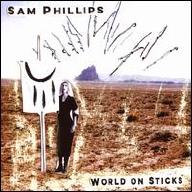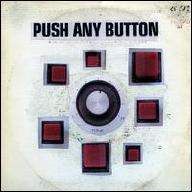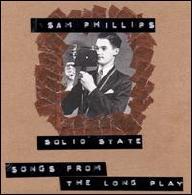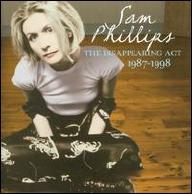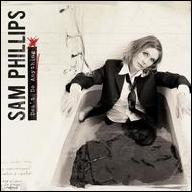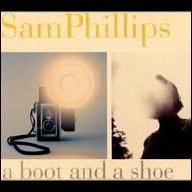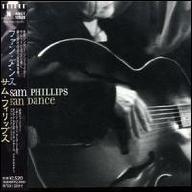Sam Phillips was born Leslie Phillips in Glendale, California, on January 28, 1962. Leslie's family were avid readers, and at a young age she became keenly interested in philosophy and spiritual matters, and was particularly keen on the works of C.S. Lewis, Thomas Merton, and G.K. Chesterton. Of her own volition, Leslie began attending Pentecostal meetings when she was 14, and she believed passionately that one could change the world for the better through music. In the early '80s, Phillips made her way into the contemporary Christian music community, singing background on recording sessions for Randy Stonehill and Mark Heard, and was signed to a record contract by Myrrh Records, one of the most successful labels in CCM.
Leslie's first album, 1983's Beyond Saturday Night, was a blend of '80s-styled pop and hard rock in the manner of Pat Benatar, but with 1984's Dancing with Danger, she adopted a more tricked-up, new wave-infused sound, with Phillips sometimes being described as "the Christian Cyndi Lauper." 1985's Black White in a Grey World followed in a similar creative direction, but even though she was a success on the CCM charts, Phillips was growing powerfully disenchanted with the corporate politics and thematic boundaries imposed by Myrrh Records, as well as the increasingly conservative viewpoint of many in Christian entertainment circles. She met producer and songwriter T-Bone Burnett, a fellow Christian with a maverick approach to songs about faith and morality, and found a kindred spirit. Phillips and Burnett became partners in both music and life (they would wed in 1989), and he produced 1987's The Turning, which followed a more streamlined creative approach and a contemplative lyrical perspective. The album was widely praised in the Christian music press and introduced her to adventurous listeners in the secular community, but Phillips' dramatic change in musical direction and newly outspoken nature did not please the executives at Myrrh Records, and she and the label parted company. (In 1987, Myrrh would release Recollection, an anthology drawn from her four albums for the company.)
Reinventing herself creatively, Phillips changed her stage name to Sam Phillips (her longtime nickname, taken from the legendary producer and founder of Sun Records), and signed a deal with Virgin Records. With Burnett as her producer and collaborator, Sam re-introduced herself with 1988's The Indescribable Wow, which paired engaging, psychedelic-infused pop melodies and production with lyrics that were as amusing as they were perceptive, moving forward with the more philosophical outlook of The Turning. The Indescribable Wow earned rave reviews, as did 1991's Cruel Inventions, which included a guest appearance from Elvis Costello, and as her following grew, The Turning was reissued, credited to Sam Phillips instead of Leslie. Phillips and Burnett embraced their Beatles influences on 1994's Martinis Bikinis, which was strongly beholden to the production style of Rubber Soul and Revolver and included guitar work from Peter Buck of R.E.M. and Colin Moulding of XTC. Widely recorded as Phillips' finest work, Martinis Bikinis earned her a Grammy nomination and the usual array of enthusiastic reviews.
In 1995, Phillips made her acting debut in the 1995 movie Die Hard With a Vengeance, in which she played a German terrorist who cannot speak; she would later make a cameo appearance as a vocalist in Wim Wenders' 1997 film The End of Violence. In 1996, Phillips released Omnipop (It's Only a Flesh Wound Lambchop), which was dominated by more experimental keyboard-oriented arrangements, and didn't fare as well with critics or fans as Martinis Bikinis. It proved to be her final original album for Virgin, with Phillips saying farewell to the label with a contract-fulfilling compilation, 1999's Zero Zero Zero.
During a pause in her recording career, Phillips took her talents in a new direction when writer and producer Amy Sherman-Palladino asked her to write music for her upcoming television series Gilmore Girls. She would go on to score 152 episodes of Gilmore Girls between 2000 and 2007, and she would continue to have a productive creative partnership with Sherman-Palladino. Phillips would also score her short-lived 2012 series Bunheads, the 2016 miniseries Gilmore Girls: A Year in the Life, and The Marvelous Mrs. Maisel beginning in 2017. During her downtime from working on Gilmore Girls, Phillips next landed a deal with Nonesuch Records, and her first release for the label was 2001's Fan Dance, which stripped down the arrangements and production in favor of a natural, intimate sound that favored Phillips' lyrics and vocals. 2004's A Boot and a Shoe followed a similar creative path, but it arrived at a time of major change in Phillips' life, as she and Burnett divorced. It wasn't until 2008 that she released her next album, and Don't Do Anything was her first album that she fully produced herself.
Don't Do Anything was the last release in Phillips' contract with Nonesuch, and she took on an unusual approach for the next step in her recording career. She launched an online subscription service for fans that she called Long Play, and for a $52 fee, members would receive regular downloads of music she would write and record over the space of 12 months, in addition to exclusive blog posts, interviews with her collaborating musicians, collage art, short films, and other original content. Between 2009 and 2011, Long Play subscribers received 42 songs spread out over five EPs and one album, and 13 highlights from the series were compiled into 2011's Solid State: Songs from the Long Play, which was issued on Phillips' own Littlebox Recordings label. One of her close allies in the Long Play project was Eric Gorfain, a violinist, arranger, and composer, and the leader of a string ensemble, the Section Quartet; he would also become her second husband. In 2013, Littlebox released the album Push Any Button, a brief but well-crafted ten-song release.
Working at her own pace, Sam Phillips returned in February 2019 with World on Sticks. ~ Mark Deming, Rovi


